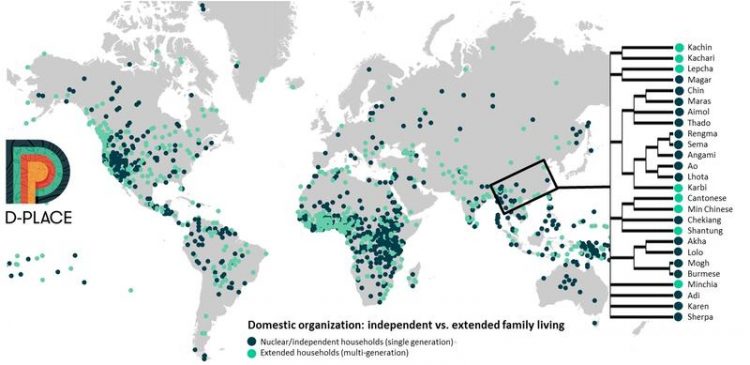Massive open-access database on human cultures created

D-PLACE: Domestic organization: independent vs. extended familie living K. Kirby, University of Toronto
The study’s lead author, Dr Kathryn Kirby, from the University of Toronto, said: “Human cultural diversity is expressed in numerous ways: from the foods we eat and the houses we build, to our religious practices and political organisation, to who we marry and the types of games we teach our children.
Cultural practices vary across space and time, but the factors and processes that drive cultural change and shape patterns of diversity remain largely unknown. D-PLACE will enable a whole new generation of scholars to answer these long-standing questions about the forces that have shaped human cultural diversity.”
Co-author Russell Gray, director of the Department of Linguistic and Cultural Evolution at the Max Planck Institute for the Science of Human History in Jena where D-PLACE is hosted said: “Comparative research is critical for understanding the processes behind cultural diversity.
Over a century of anthropological research around the globe has given us a rich resource for understanding the diversity of humanity – but bringing different resources and datasets together has been a huge challenge in the past. We’ve drawn on the emerging big data sets from ecology, and combined these with cultural and linguistic data so researchers can visualise diversity at a glance, and download data to analyse in their own projects.”
D-PLACE allows users to search by cultural practice (e.g., monogamy vs. polygamy), environmental variable (e.g. elevation, mean annual temperature), language family (e.g. Indo-European, Austronesian), or region (e.g. Siberia). The search results can be displayed on a map, language tree, or in a table, and can also be downloaded for further analysis. The D-PLACE database comprises information mainly on pre-industrial societies that were described by ethnographers in the 19th and early 20th centuries.
It aims to enable researchers to investigate the extent to which patterns in cultural diversity are shaped by different forces, including shared history, demographics, migration/diffusion, cultural innovations, and environmental and ecological conditions.
D-PLACE was developed by an international team of scientists interested in cross-cultural research. It includes researchers from Max Planck Institute for the Science of Human history in Jena Germany, University of Auckland, Colorado State University, University of Toronto, University of Bristol, Yale, Human Relations Area Files, Washington University in Saint Louis, and the University of Michigan.
The diverse team included linguists; anthropologists; bio-geographers; data scientists; ethnobiologists; and evolutionary ecologists, who employ a variety of research methods including field-based primary data collection; compilation of cross-cultural data sources; and analyses of existing cross-cultural datasets.
The team’s diversity is reflected in D-PLACE, which is designed to appeal to a broad user base. Envisioned users range from members of the public world-wide, who are interested in comparing their cultural practices with those of other groups, to cross-cultural researchers interested in pushing the boundaries of existing research into the drivers of cultural change.
Publication
Kathryn R. Kirby, Russell D. Gray, Simon J. Greenhill, Fiona M. Jordan, Stephanie Gomes-Ng, Hans-Jörg Bibiko, Damián E. Blasi, Carlos A. Botero, Claire Bowern, Carol R. Ember, Dan Leehr, Bobbi S. Low, Joe McCarter, William Divale, and Michael C. Gavin (2016), D-PLACE: A Global Database of Cultural, Linguistic and Environmental Diversity, PLoS one
Weitere Informationen:
D-PLACE can be accessed here: https://d-place.org
Media Contact
All latest news from the category: Social Sciences
This area deals with the latest developments in the field of empirical and theoretical research as it relates to the structure and function of institutes and systems, their social interdependence and how such systems interact with individual behavior processes.
innovations-report offers informative reports and articles related to the social sciences field including demographic developments, family and career issues, geriatric research, conflict research, generational studies and criminology research.
Newest articles

First-of-its-kind study uses remote sensing to monitor plastic debris in rivers and lakes
Remote sensing creates a cost-effective solution to monitoring plastic pollution. A first-of-its-kind study from researchers at the University of Minnesota Twin Cities shows how remote sensing can help monitor and…

Laser-based artificial neuron mimics nerve cell functions at lightning speed
With a processing speed a billion times faster than nature, chip-based laser neuron could help advance AI tasks such as pattern recognition and sequence prediction. Researchers have developed a laser-based…

Optimising the processing of plastic waste
Just one look in the yellow bin reveals a colourful jumble of different types of plastic. However, the purer and more uniform plastic waste is, the easier it is to…



